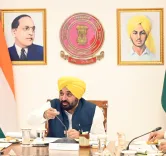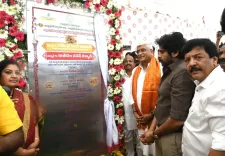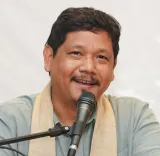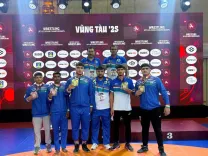How did leading academic C Raj Kumar and Abhishek Singhvi engage with members of the Japanese Parliament?
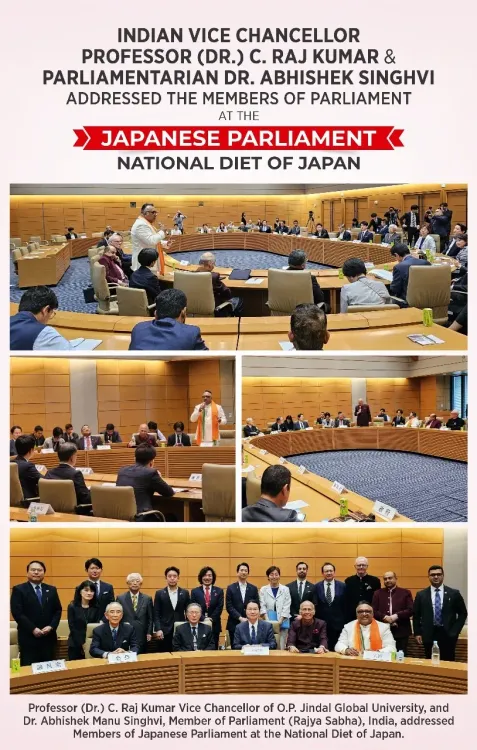
Synopsis
Key Takeaways
- Strengthening India-Japan ties through education and collaboration.
- Importance of inter-parliamentary dialogue in addressing global challenges.
- Shared democratic values as a foundation for mutual growth.
- Investment in knowledge and institutions to promote peace and sustainability.
- Potential for deeper collaboration in technology and climate resilience.
Tokyo, June 26 (NationPress) Professor (Dr) C. Raj Kumar, the Founding Vice Chancellor of O.P. Jindal Global University (JGU), spoke to members of the Japanese Parliament at the National Diet of Japan during a significant policy dialogue focused on enhancing India-Japan strategic partnerships.
This esteemed gathering, organized by the Japanese Parliamentary Committee for World Federation, centered on the topic: “India and Japan: Partners in Democracy, Drivers of Innovation, and Architects of a Sustainable Future.”
While addressing the Japanese Parliamentarians, Professor (Dr) C. Raj Kumar emphasized the increasing importance of inter-parliamentary dialogue and academic collaborations in addressing shared global issues.
“We are at a pivotal moment where universities and parliaments are called to collaborate in shaping the future of democracy and development,” stated Professor Kumar. “India and Japan can set a precedent—not only through economic collaboration but by investing in individuals, knowledge, and institutions that promote peace, justice, and sustainability.”
He further remarked: “JGU’s involvement in Japan’s Parliament illustrates the transformative power of education in bridging cultures and fostering alliances. We hold that meaningful diplomacy must be rooted in academic, intellectual, and people-oriented engagement.”
A highlight of the event was the address by Dr Abhishek M. Singhvi, a Senior Advocate at the Supreme Court of India and Member of Parliament (Rajya Sabha), who passionately discussed the shared democratic principles of India and Japan and their potential to shape the global narrative.
Dr Singhvi advocated for a deeper partnership between India and Japan in domains such as technology, education, climate resilience, and global governance, emphasizing the need for a peaceful, inclusive, and sustainable Indo-Pacific vision.
“India and Japan are not merely allies by chance—we are civilizational partners in democracy, innovation, and global responsibility,” remarked Dr. Singhvi.
“As two of Asia’s most robust democracies, our mission is to jointly lead by example—through pluralism, peace, and principled partnerships for the planet.”
The gathering attracted over 35 senior members of the Japanese legislature and government officials. Seishiro Eto, the Former (17th) President of the Japanese Parliamentary Committee for World Federation (Acting President in the absence of Chairman Fukushiro Nukaga), inaugurated the dialogue and warmly welcomed the distinguished Indian guests.
H.E. Sibi George, the Ambassador of India to Japan, participated in the interaction and expressed his sincere gratitude to the members of the Japanese Parliament, the Government of Japan, and the Indian delegation from O.P. Jindal Global University, led by Professor (Dr) C. Raj Kumar, for promoting meaningful bilateral cooperation in higher education and research.
Shingo Miyamoto, Director-General, Ministry of Foreign Affairs, South Asia Department, conveyed his optimism regarding the rapidly expanding relations between Japan and India across various sectors, particularly in the realm of higher education and institutional cooperation.
Kuniko Inoguchi, Member of the House of Councillors, Former Minister of Gender Equality, and Professor at Sophia University, graciously welcomed the Indian delegation. She highlighted her long-standing engagement with India and expressed her enthusiasm for fostering a greater presence of Indian students and knowledge traditions in Japan.
Dr Sukehiro Hasegawa, a respected parliamentary expert and former UN official, welcomed the strengthening of India-Japan exchanges, stating, “Japan seeks Indian creativity and imagination to invigorate its global policies, enabling both countries to emerge as formidable global leaders together.”
The event showcased participation from a diverse array of Japanese political parties and parliamentary experts, reflecting a strong, cross-party interest in fortifying Indo-Japanese relationships.
Notable participants at the National Diet of Japan included:
Liberal Democratic Party:
Masahiko Shibayama, Member of the House of Representatives, Acting Secretary-General, Former Minister of Education, Culture, Sports, Science and Technology
Kuniko Inoguchi, Member of the House of Councillors, Co-Vice Chairperson, Former Minister of Gender Equality
Fukushiro Nukaga, Member of the House of Representatives, President, Japanese Parliamentary Committee for World Federation, Former Minister of Finance, Former Director-General of the Japan Defence Agency
Rintaro Ishibashi, Member of the House of Representatives
Yohei Onishi, Member of the House of Representatives
Masaaki Koike, Member of the House of Representatives
Jun Tsushima, Member of the House of Representatives
Hirofumi Takinami, Member of the House of Councillors
Constitutional Democratic Party of Japan:
Yuki Baba, Member of the House of Representatives
Motoko Mizuno, Member of the House of Councillors
Mamoru Umetani, Member of the House of Representatives
Hiroki Saito, Member of the House of Representatives
Shinji Sugimura, Member of the House of Representatives
Sekio Masuda, Member of the House of Representatives
Daiki Michishita, Member of the House of Representatives
Issei Yamagishi, Member of the House of Representatives
Hiroshi Kasa, Member of the House of Representatives
Ayaka Shiomura, Member of the House of Councillors
Democratic Party For the People:
Kiichiro Hatoyama, Member of the House of Representatives (Son of Former Prime Minister Hon’ble Yukio Hatoyama)
Japan Innovation Party:
Kenta Aoshima, Member of the House of Councillors
Japanese Communist Party:
Tetsuya Shiokawa, Member of the House of Representatives
NHK Party:
Satoshi Hamada, Member of the House of Councillors
Sanseito:
Yuko Kitano, Member of the House of Representatives
Independent:
Makiko Dogome, Member of the House of Councillors
Government of Japan:
Shingo Miyamoto, Director-General, Ministry of Foreign Affairs, South Asia Department
Collaborating Organization
WFM Youth Forum:
Koji Mitamura, Chairperson
Kohei Mitamura, President, Mitamura Group (Fukuho Bank Founding Family, Owner of Bunky Corporation entrusted by MEXT, and the Koshinomiyako Media Network)
Parliamentary Experts:
Dr Sukehiro Hasegawa, Former Special Representative of the UN Secretary-General
Masakuni Tanimoto, International Committee Chairman of WFM-Japan; Under Secretary-General, Japanese Parliamentary Committee for World Federation
This parliamentary engagement marked Professor Raj Kumar’s second consecutive address at the National Diet of Japan, following his 2024 lecture on “The Role of India and Japan in Global Governance.”
His return this year reaffirms O.P. Jindal Global University’s unwavering commitment to academic diplomacy and its growing leadership in enhancing India-Japan relations through education.
The interaction at the National Diet served as a compelling testament to the shared democratic values, strategic alignment, and mutual aspirations of India and Japan.
It underscored the vital role of education, research, and intellectual exchange in shaping a resilient, innovative, and peaceful future for both nations and the broader Indo-Pacific region.

